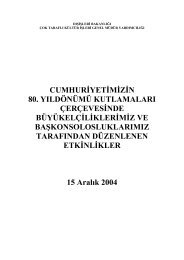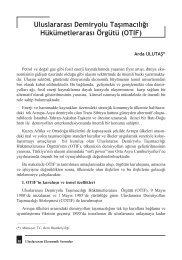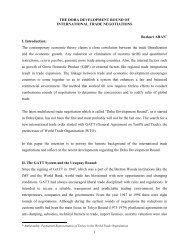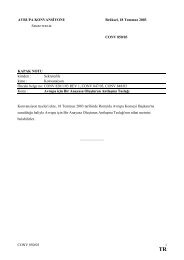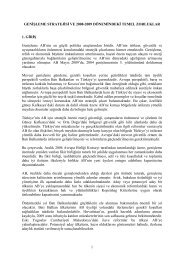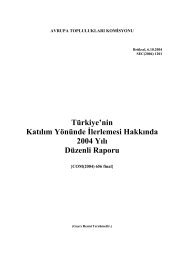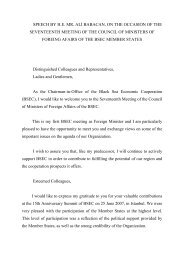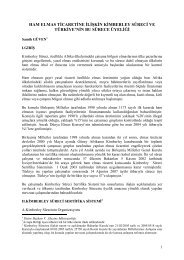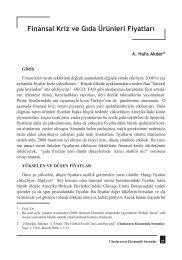Enlargement Strategy and Main Challenges 2006 - 2007
Enlargement Strategy and Main Challenges 2006 - 2007
Enlargement Strategy and Main Challenges 2006 - 2007
You also want an ePaper? Increase the reach of your titles
YUMPU automatically turns print PDFs into web optimized ePapers that Google loves.
absence of a proper legal framework. Further efforts are needed to develop trust between<br />
ethnic communities. The representation of the different communities in the public<br />
administration is uneven. There has been some progress in the implementation of the action<br />
plans under the 2005-2015 Decade of Roma Inclusion. However, the situation of the Roma<br />
community continues to cause concerns.<br />
Regarding regional issues <strong>and</strong> international obligations, the former Yugoslav Republic of<br />
Macedonia has maintained full cooperation with the International Criminal Tribunal for the<br />
former Yugoslavia. Further progress in the reform of the judiciary is essential to prepare for<br />
the transfer of the cases to be returned by the ICTY. The country maintained a constructive<br />
position on Kosovo status talks. The bilateral non-surrender agreement with the United States<br />
of America is still not in line with the relevant EU guiding principles concerning<br />
arrangements between a state party to the Rome Statute of the International Criminal Court<br />
<strong>and</strong> the USA.<br />
The former Yugoslav Republic of Macedonia has remained an active partner in regional<br />
cooperation. Bilateral relations with neighbours have developed; however, there has been no<br />
progress on the name issue, which remains an open problem. Renewed efforts are needed,<br />
with a constructive approach, to find a negotiated <strong>and</strong> mutually acceptable solution on the<br />
name issue with Greece, under the auspices of the UN, thereby contributing to regional<br />
cooperation <strong>and</strong> good neighbourly relations.<br />
As regards economic criteria, the former Yugoslav Republic of Macedonia is well advanced<br />
in establishing a functioning market economy. Continued stabilisation <strong>and</strong> reform efforts are<br />
needed to enable it to cope with competitive pressure <strong>and</strong> market forces within the Union in<br />
the medium-term.<br />
The country has maintained a broad consensus on the essentials of economic policies. As a<br />
result of a sound policy mix, macroeconomic stability <strong>and</strong> predictability have further<br />
increased. Inflation has remained under control. Public sector accounts have been kept close<br />
to balance <strong>and</strong> the relatively low level of public sector debt has declined further. Price <strong>and</strong><br />
trade liberalisation are largely completed, <strong>and</strong> the privatisation of state-owned enterprises has<br />
proceeded. Barriers to market entry <strong>and</strong> exit have been reduced by simplifying <strong>and</strong><br />
accelerating bankruptcy <strong>and</strong>, in line with a key priority of the European Partnership,<br />
registration procedures. The financial sector's stability has improved. Furthermore, measures<br />
have been taken to improve the quality of human capital <strong>and</strong> to upgrade the country's<br />
infrastructure. Foreign direct investment inflows increased significantly, mainly driven by<br />
privatisation efforts. Economic integration with the EU is well advanced.<br />
However, the functioning of the market economy is still impeded by institutional weaknesses,<br />
such as the slow speed of administrative procedures, corruption, red tape <strong>and</strong> a low degree of<br />
legal certainty. Shortcomings in the judiciary continue to be bottlenecks, impeding a faster<br />
improvement in the business climate. Furthermore, labour <strong>and</strong> financial markets are still<br />
poorly functioning, which hinders the reduction of the particularly high unemployment <strong>and</strong><br />
hampers credit provision to enterprises. The education system does not sufficiently reflect the<br />
country's needs. These factors allowed only moderate economic growth. The considerable<br />
informal sector continues to cause major distortions in the economy. The commodity structure<br />
of exports is very concentrated.<br />
The country has made further efforts to improve its ability to assume the obligations of<br />
membership. The country still faces major challenges in implementing <strong>and</strong> effectively<br />
EN 36 EN




